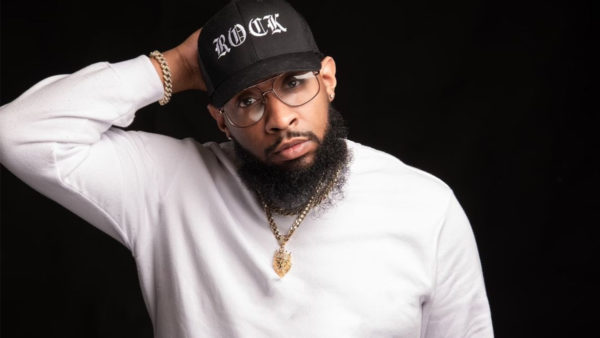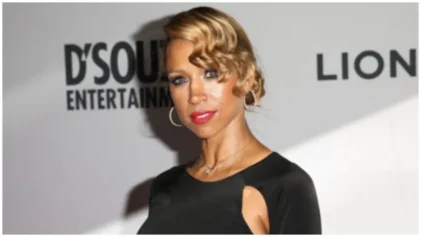Pastor Mike McClure Jr., aka Pastor Mike Jr., is passionate about showing the Christian community that there is a space for “the ratchet and the righteous” through his music and his ministry.
The Rock City Church pastor has been climbing the charts since the release of his 2020 debut album “Live Free” and hit single “Big,” and took home Stellar Awards two consecutive years in a row, first for Best New Artist in 2020 and again this year for Best Artist. When he’s not creating blessed bops for the masses, the 38-year-old still makes time to connect with his church community and be a present husband and father of five.

The Billboard hit gospel artist — spoke with Atlanta Black Star about how he’s been adjusting to his rising fame and how he’s proving that you don’t have to choose between leading a successful church community and being a #1 Billboard recording artist.
Tell me a little bit about just your background growing up? I know that your church is based in Alabama. Were you born in Alabama?
I was born in Tacoma, Washington, and my brother was born in Stuttgart Germany, my sister in Colorado. We made our way to Birmingham, Alabama. My grandfather is a civil rights icon, he walked with Dr. King and Shuttlesworth and Abernathy. Birmingham is really all I know. I was that kid who literally would travel around the country with my dad. He was a pastor; I would sing a solo before he preached. While most kids were in the streets, I was at Vacation Bible School. I’ve always been in love with God and the local church. And we started this church, and I was 25 years old. It was me and 10 of my friends and to give you the fast version at 25, it was 10 of us by 26, it’s eight or 900 of us by 27 it’s five or 6,000 people in an arena. And we just been committed to blessing people and changing lives. And the rest is history.
One of my questions for you was actually which love came first, music or ministry? But I know you said that it’s been ministry since you were a young child. So when did music come along for you?
It’s always been both. That’s what’s crazy. I used to say things like, “Well, I’m called a pastor, I choose to stay.” And over the last six months I heard the Holy Spirit say, “No that’s inaccurate, I called you to speak to my people.” Sometimes I use spoken words, sometimes I use melodies. So, for me, when I look back over my life, music and ministry has always been synonymous. The first thing I ever did in the church was sing in the youth choir. For me, I believe they’re one and the same, and I believe right now, if you think about it. I had a pastor tell me yesterday, he was like, “I can’t believe you’re traveling the world singing, you need to get back to pastoring.” I said, “I never stopped pastoring.” I said, “Can I ask you a question?”
He said, “What’s that?” I said, “Have you ever seen a 21 million-view sermon?” He said, “I don’t think I have.” I said, “Well, I have a 21 million-heard song.” I said, “Gospel music is the only genre of music were the message plus the melody equals a miracle.” I said, “So when you hear me saying ‘Big.’ I’m preaching about faith. When you hear me saying, ‘I Got It,’ I’m preaching about faith.” I really believe, man, that I’m done, in a sense, trying to pick which one, I believe there’s the people, yourself included, who God’s raising up, that it’s not either or, it’s both and. I can interview and be an entrepreneur. I can do radio, and I can have a successful podcast TV show. It’s not either or, it’s both and.
You’re kind of expanding the definition and the understanding of what it means to be delivering the word.
Yeah. We don’t realize you look just like when they told LeBron James “Shut up and dribble.”
They don’t realize how disrespectful it is. Who are you to tell me? Or who are you to tell someone what they can and can’t be when God’s given them the favor of God over their lives? And for me, I really believe the reason so many people are resonating with not just the music, but the ministry is because it’s this audacity, what Barack Obama called “the audacity of hope.” It’s the boldness to say, “Hey, here’s what I’m going to do.” So many people laughed at me, so many record labels turned me down, so many record execs just practically told me to my face they didn’t see anything special. And I’m so grateful they said that, because had they saw something special, they would have took the credit for it. Now that we look back two years later, we can say it was nothing but God.

Most people, when they think hip-hop — because your style is a little bit like gospel and hip-hop combination — and we think hip-hop, the messages that you think about don’t necessarily align with what we learned in church. So, what has been your approach to making space for both at the same time?
Here’s the crazy part, and don’t laugh at me when I say that all of us are righteous and ratchet. That’s the funny part. All of us love God, but when you get in a car and you had a good day, you probably playing something that’s going to make you dance. So, for me, one thing I do love about hip-hop, hip-hop is … so bold and so wrapped in faith. You mean to tell me that a young cat can be in his mama basement broke, barely knowing how he going to eat, get on a microphone and say, “One day I’m going to have gold chains and 20-inch rims.” And get it?! That’s called faith.
That’s what the Bible says, “Speak those things that are not as though they were.” And what’s crazy is it feels as if the world has more faith than the church. I try my best to wrap everything I do in faith. I try to put music around it that makes you move. And I just call it real life music. My goal is to be the king of R&G, rhythm and gospel. So I’m excited about what God is doing.
What would you say to critics who feel like you’re being too “worldly”? There is always a little bit of pushback in the community, in the Christian community, when something new comes along. When I was younger, Kirk Franklin was new and there was a lot of controversy around his music. So what do you have to say to critics who might say that you’re a little bit too worldly, that there is no space for hip-hop and gospel?
I pray somebody [reading] this can be blessed, always understand when they can’t categorize you they criticize you. And whenever people can’t properly categorize you, they place you in a box because people fear what they don’t understand. So, my pushback to those who kind of critique what I’m doing is “I’ll pray for you.” You know, a lot of times you got to think about it. Andraé Crouch was considered radical when he hit the scene, James Cleveland was considered radical he hit the scene, Fred Hammond was considered radical when he hit the same. Kirk Franklin was the devil, if you remember.
I can remember being a little kid and when it was youth day and we wanted to step to “Stomp” it was like, “Don’t play that in this church.”
What advice would you give to churches that might be struggling to connect with the younger generation?
I would tell them, ‘You can’t criticize and evangelize at the same time.’ A lot of times you’re so busy criticizing this next generation, that by the time you try to offer them Jesus, they’ve already turned you off.
So for me, I would say, ‘Be open and honest and realize just because it’s different, it doesn’t mean it’s demonic.’ I’m going to say that again. Just because it’s different doesn’t mean it’s demonic. I believe this next wave of Christian will be bossy and blessed. They will be saved and swaggy. When I preach, I have on two earrings, and yesterday I preached, and my shirt cut kind of low, and they could see my tattoo. And one of my members emailed me, he was like, “Pastor, I didn’t know you had a tattoo.” I was like, “Yes,” and they were like, “What did God say about tattoos?” I had to break down a scripture on that.
I think so many times, we’re so worried about what people have on that we don’t take the time to put anything in them. I would tell a pastor right now, ‘Man, you can’t clean a fish till you catch it. Stop wasting so much time critiquing the fish and just go out there and win them and be humble and love them.’ You come with all this stuff going on now with Hebrew Israelites and conscious movements and all this stuff people are really lost. I think right now they’re looking for community, and if we continue to critique them we’re going to miss a whole generation.
To read more stories like this, visit AtlantaBlackStar.com
This interview has been edited and condensed for length and clarity.


